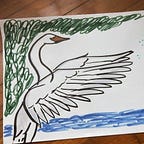Conversations with friends: Writing about topics that matter
I started ‘Regenerative Spiral’ as a Medium Writing Project with friends. Two months after the first articles were published, three of us made time for a Zoom check-in.
It was K’s and Z’s first ‘meeting’. We started the conversation with the articles they contributed, and why what they wrote was important to them. For K, it’s important for children to be nurtured in Nature. Z hopes to highlight the potential of small food farms in building connections amongst people.
K asked, “What did you have for lunch?” This was a question that got us thinking about the food we had, where the food came from, and what’s in the daily awareness and choices of the ordinary person in Singapore.
Z mentions that a significant number of commercial food farms are losing the land they had, with some ending their business as early as July. He is making time to go to the farms to meet with people. He hopes to write about how they feel about this situation, which coincides with Singapore’s push for greater availability of locally grown and nutrient-dense food. He hopes to give a historical and social context, so that his article goes beyond his personal views on the topic.
We note that Singapore seems to overly rely on the promise of high-tech for its local food security projections. This happens as many no/low-tech food farms feel forced to lose their land, with families and their younger generation having to consider other livelihood alternatives. Singapore is fast losing knowledge that families have gathered over decades of firsthand farming experience, without providing a clear meaningful way for these people, their skills, knowledge and experience to continue be a key part of Singapore’s food future.
At the same time, we notice an increasing openness to experimenting with new ideas. Now is a stage of possibilities where people in the midst of figuring things out. It is important to highlight feasible social models that take people’s concerns into consideration.
There is power of social media in highlighting good ideas. Community fridges, food rescues, soup kitchens, regular distribution of locally grown and nutritious food, little libraries — these are are good ideas that are often implemented in isolation. Increasingly, social media — and key personalities — have played a role in helping people to connect the dots, and bringing these to the mainstream.
K sees children as the future. She points out that it is important that children have the learning space and opportunity; hands-on experiences; and supportive family to integrate learnings into daily life.
K asks about the possibility of having agriculture as essential education at primary schools. She shared that her child was given seeds but told to do germinate them ‘when you are free’. She points out that this is a reflection of how community gardens are viewed and managed.
K brings us back to the topic of lunch. Making food for herself was a turning point. K started making compost after being more aware about the waste she was generating. To her, it is important to close the loop. Compost, grow food, eat what you harvest, compost the waste you generate. It’s by experiencing the closed loop that students see the system, and a purpose.
We mentioned how it took the pandemic and the Ukraine war for ordinary people in Singapore to think deeper about the food we eat, and how they came to be on our table.
We ended the call with the thought of what kind of different lifestyle people in Singapore can practice in a new ‘age’.
